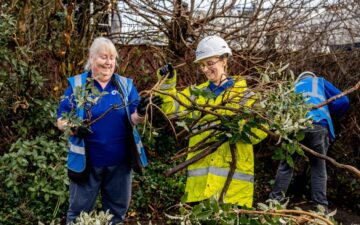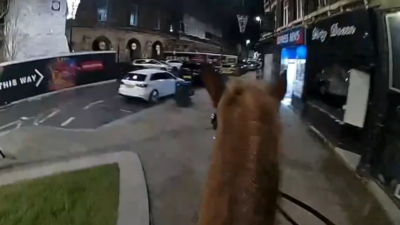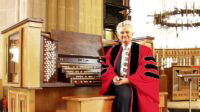Blackburn Cathedral is once again facing a safeguarding and leadership crisis following the suspension of its Dean and the sudden departure of its Safeguarding Officer—despite nearly a decade of safeguarding audits, reviews, and repeated promises to learn lessons from past failures, including the Canon Andrew Hindley case.
Planning a night out? See the live What’s On in Blackburn calendar.
Abuse has been a serious problem at Blackburn Cathedral for decades. Safeguarding failures have caused harm to children, young people, and vulnerable adults across generations. Survivors continue to live with the consequences of these failures today.
An independent safeguarding audit, published on 28 May 2025 by the INEQE Safeguarding Group, makes 28 urgent recommendations. It concludes that safeguarding arrangements at Blackburn Cathedral are “inadequate and require immediate action.”
The audit follows a series of reviews, including the 2016 SCIE audit, the 2020 Cathedral safeguarding audit, Past Cases Review 2 (PCR2) in 2021, and the 2023 Lessons Learned Review. The audit states that the Cathedral’s safeguarding culture is affected by both “legacy and contemporary issues.”
Leadership Fails to Protect as Safeguarding Scandal Unfolds
On 30 June, the Diocese of Blackburn confirmed that Dean Peter Howell-Jones had been suspended under the Clergy Discipline Measure (CDM). An interim Dean is due to be appointed. The nature of the complaint has not been disclosed.
The Cathedral’s safeguarding officer, Jenny Price, also left her post last week, as confirmed in a Cathedral-wide message. Safeguarding responsibilities are now temporarily covered by a member of the Diocesan Safeguarding Team.
The Scandal Blackburn Cathedral Can’t Escape: Hindley Case Trauma Lives On
The audit highlights the continuing emotional and cultural impact of past safeguarding failures, stating:
“The impact of past safeguarding failures by the Church has been profound. The legacy of trauma and pain continues to be felt.”
It further notes:
“The anxiety following the recent exposé of the Hindley case persists and has impacted many staff, volunteers and leaders.”
Canon Andrew Hindley, who served at the Cathedral between 1991 and 2021, was subject to five police investigations and multiple safeguarding concerns. A 2007 NSPCC risk assessment described him as posing “a risk of significant harm to children and young people.” Restrictions placed on his ministry were not adequately monitored.
Safeguarding expert Ian Elliott told the BBC that plans to close Blackburn Cathedral during the Hindley safeguarding crisis were:
“Appalling and ridiculous.”
Former Cathedral Precentor Rowena Pailing, who resigned in protest at the Church’s handling of the case, said:
“I couldn’t work for an organisation which put its own reputation and the protection of alleged abusers above the protection and care and listening to victims and survivors.”
The Cathedral’s Leadership Promised Change — the Audit Found Chaos Instead
The audit states:
“Some participants in the Audit frequently mentioned internal conflict during discussions. They stated a desire to move away from the ‘rigid, silenced approaches of the past’.”
Safeguarding leadership at the Cathedral was found to be “inappropriate and unsustainable,” with the Dean directly involved in safeguarding activity. Neither the part-time Cathedral Safeguarding Advisor nor the Diocesan Safeguarding Officer was able to provide independent safeguarding leadership or challenge senior clergy.
The audit identified that “record-keeping is poor” and separately reported “inconsistencies in case management and record keeping.”
It also noted that DBS checks were “not currently required for education volunteers involved in school visits.” In a separate section, the audit explained that this practice contradicts government guidance regarding regulated activity with children.
Faced with Crisis, Cathedral Promises Urgent Reform
In response, Blackburn Cathedral has publicly accepted all 28 recommendations and claims to have already taken urgent actions, including:
- Partnering with the Diocese for safeguarding casework;
- Appointing two safeguarding-experienced members to the Cathedral Chapter;
- Transferring safeguarding files to the National Safeguarding Case Management System;
- Planning the creation of an independent Safeguarding Improvement Board.
A Cathedral spokesperson said:
“We welcome the INEQE report and the courage and commitment of everyone who supported this important work, especially those survivors of abuse who were able to share their experiences.
Safeguarding is our number one priority and we have taken swift and decisive action to implement the most urgent recommendations.
We apologise unreservedly to anyone who feels let down by our previous safeguarding arrangements.”
Behind the Praise: Serious Safeguarding Failures Still Haunt the Diocese
The audit praises the Diocese for its safeguarding leadership, noting:
“The Diocese works with a ‘safeguarding first approach’, prioritising the safety of people and not hesitating, when appropriate, to make difficult decisions.”
Survey respondents described diocesan safeguarding culture as “‘welcoming’, ‘collaborative’, ‘inclusive’ and ‘forward-thinking’.”
However, the audit also identified significant challenges at diocesan level, not just within the Cathedral. It found that the Diocesan Safeguarding Team “is currently too small to deliver all expected functions and lacks capacity for strategic development.” Survivor engagement through the Survivor Consultative Group is described as needing further development.
The audit highlights several areas where urgent work is required. These include:
- Persistent gaps in safeguarding training compliance across clergy and church officers, with the audit calling for stronger enforcement and escalation processes where training is incomplete.
- Weak survivor representation on the Diocesan Safeguarding Advisory Panel (DSAP), limiting survivors’ influence on safeguarding strategy and oversight.
- A Survivor Consultative Group that is small and underdeveloped, with the audit urging broader engagement to reflect a wider range of survivor voices.
- Inconsistencies in record-keeping and case management, including the need for clearer rationale in risk grading decisions, better prioritisation of safeguarding actions, and improved use of concern summaries on the National Safeguarding Case Management System.
- A lack of structured survivor care plans and inconsistent communication with victims and survivors, meaning some do not receive timely updates on safeguarding cases affecting them.
The audit also recommends the creation of an operationally independent Safeguarding Directorate, with the authority to provide expert safeguarding advice, challenge senior clergy, and escalate concerns without undue influence. This structural reform, which is critical to safeguarding independence, was not addressed in detail in the Diocese’s public response.
While the Diocese acknowledged some of these areas in its statement, the public messaging focused heavily on praise for its safeguarding culture and on the Cathedral’s failings. This emphasis risks giving the impression that safeguarding problems lie only within the Cathedral, when the audit clearly found serious operational gaps within the Diocese itself.
Rt Rev. Philip North, Bishop of Blackburn, responded saying: “The outcome of the audit into our safeguarding work across the whole Diocese of Blackburn is a fair assessment of the progress made in our ongoing work to make the Church a safer place.
“I am grateful to INEQE for highlighting areas which will be avenues for improvement and have already set to work on a number of these. For example, the Diocesan Board of Finance (DBF) directors, have already appointed a further case worker to the Safeguarding Team.
“We have also taken steps to grow our survivor group which advises the Diocesan Safeguarding Adviser (DSA) and Diocesan Safeguarding Advisory Panel (DSAP) making sure survivors of abuse are at the centre of decision making in safeguarding matters and ensuring that their voice will be heard. INEQE also identified our Parish Safeguarding Officers as key partners in our work.”
Bishop Philip North said in response to the report about the Cathedral:
“The report highlights a number of urgent actions required at the Cathedral and, whilst there is some good practice, significant work is needed.”
He added:
“I have met with Cathedral Chapter this week and I am pleased to hear their commitment to immediately taking action on the recommendations found in their report.”
He also stated:
“It is clear from the audit published today there is a need for the Cathedral to act swiftly to make improvements and the Diocese continues to be happy to offer support to the Cathedral to implement in full the recommendations contained in the report.”
Finally, he thanked contributors to the audit process, saying:
“Thank you to those who answered questionnaires and met with the auditors, particularly survivors of abuse who were prepared to share their stories with bravery and openness. We are committed to placing survivors at the centre of our decision-making and we will continue to ensure this remains key to our approach to safeguarding.”
Audit Delivers Blunt Verdict: Safeguarding Risks Far from Solved
The audit highlighted a “gap between the intended outcomes and actual implementation” regarding the Memorandum of Understanding (MoU) between the Diocese and Cathedral.
Separately, it identified shortcomings in safeguarding leadership and in communication with victims and survivors, but these were discussed in distinct sections of the report.
The audit recommended the creation of an operationally independent Safeguarding Directorate across the Diocese and Cathedral to strengthen safeguarding leadership and remove conflicts of interest.
Change or Collapse? Blackburn Cathedral’s Safeguarding Reckoning
Despite safeguarding reviews in 2016, 2020, 2021, and 2023, the 2025 audit shows that safeguarding leadership and culture at Blackburn Cathedral remain incomplete and hampered by legacy challenges.
Whether this latest set of reforms will finally bring lasting change remains to be seen.
Support for anyone affected is available through Safe Spaces (0300 303 1056).







